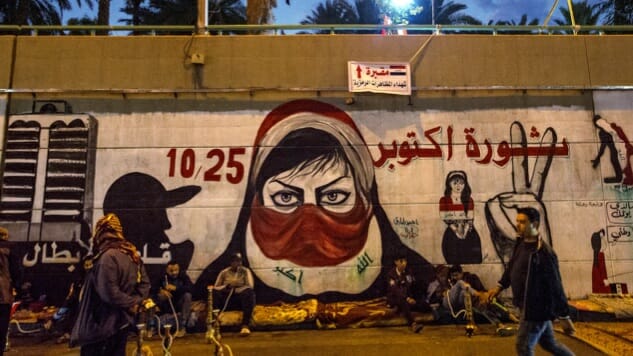In Iraq, the U.S. Has Two Choices: Total Withdrawal, or War
Photo by Scott Peterson/Getty
You’re forgiven if you’ve found the recent news in Iraq difficult to understand, because like many conflicts in the region, it involves complicated alliances, uncertain facts, and Americans blundering into situations we don’t understand, setting in motion a chain of events whose consequences we can’t begin to anticipate. So, to summarize in a way that will likely still be a massive over-simplification, thousands of protesters in Iraq have attacked the U.S. embassy in Baghdad, smashing windows and doors and breaking through the main gate into an inner courtyard where they came face to face with U.S. troops. Why did this happen? Let’s trace it back:
1. The protesters were furious at U.S. airstrikes against a militia called Kataeb Hezbollah, which killed 25 over three targets in Iraq and Syria. (This militia is different from the Hezbollah that operates in Lebanon.)
2. The strikes were in retaliation for a rocket attack on an Iraqi military base—allegedly carried out by the militia last week—which killed an American contractor and wounded six others, including four American service members.
3. So why were Iraqis upset when the militia apparently attacked their own country’s military base? Well, first you have to know two basic and seemingly contradictory facts. The first is that Kataeb Hezbollah is backed by Iran. The second is that they’re also part of an Iraqi “state-sponsored” umbrella organization of militias formed in 2014 called the Popular Mobilization Forces. The PMF militias operate somewhat autonomously, but are officially incorporated into the Iraqi armed forces. They have been critical in battling ISIS in Iraq. In this sense, the U.S. and Kataeb Hezbollah are “allies.”
4. Butttt…not really. Kataeb Hezbollah was founded in 2003, and fought against American forces when they first invaded Iraq. They were designated as a terrorist organization by the State Department in 2009. Yet as a Shia militia, they sent members to fight with Assad in Syria, and continue to fight against ISIS (and other Sunni militants) in Iraq. So when American forces attack such a Shia group, some Shiites in Iraq become angry. But, lest you think even this small piece of the puzzle is simple, protesters in Iraq are also furious at Iran, and have recently attacked their consulate.
5. To recap the current situation: After the attacks, the retaliation, and the violence at the embassy, the U.S. is currently calling on the Iraqi military to protect American forces in its embassy who are under siege by protesters who are upset that the U.S. attacked a militia incorporated under the same Iraqi military, but in apparent retaliation for an attack by that militia on an Iraqi military target.
6. So why would Kataeb Hezbollah attack an Iraqi military base? Well, if you believe the U.S. version, it’s because their actual target was “coalition forces,” i.e. the remainder of the American presence in Iraq—about 5,000 troops who stay to fight ISIS. And it may have been done at the behest of Iran, as part of the ongoing proxy war between the two nations in the Middle East…all of which leaves the fragile Iraqi government caught in the middle, since they need the help of both groups, even if one of them moonlights by attacking their own military.
Are you thoroughly confused yet?
Iran killed an American contractor, wounding many. We strongly responded, and always will. Now Iran is orchestrating an attack on the U.S. Embassy in Iraq. They will be held fully responsible. In addition, we expect Iraq to use its forces to protect the Embassy, and so notified!
— Donald J. Trump (@realDonaldTrump) December 31, 2019
The complexity of the situation in Iraq is such that even after you understand a few links in the cause-and-effect chain, you come away more baffled than ever. The only clear answer is that committing to more violence in the midst of this cauldron is a terrible idea, and one that will lead to escalations. We just dodged what looked like an inevitable war with Iran when Trump came to his senses and canned the raving psychopath John Bolton, but this kind of action in Iraq leads inexorably back to the same conflict. It also destabilizes an already unstable Iraqi government, which could turn that floundering country into another Libya.
Clearly, the U.S. doesn’t want Iran’s influence in Iraq to be entirely unchecked, and clearly we resent the presence in Iraq of a group of militias ideologically and strategically aligned with Iran, even if those militias are critical in keeping ISIS at bay. Yet the rocket attacks that killed the American contractor, as well as the subsequent retaliations and protests, show that the only predicable outcome of engaging in these byzantine fights is more violence and a slow but steady march to war. And for what? It’s time to withdraw the remaining U.S. troops in the region, cut our economic ties, and leave. There is no middle ground, and there is no status quo—there’s either moving toward another disastrous war, or moving away.







































